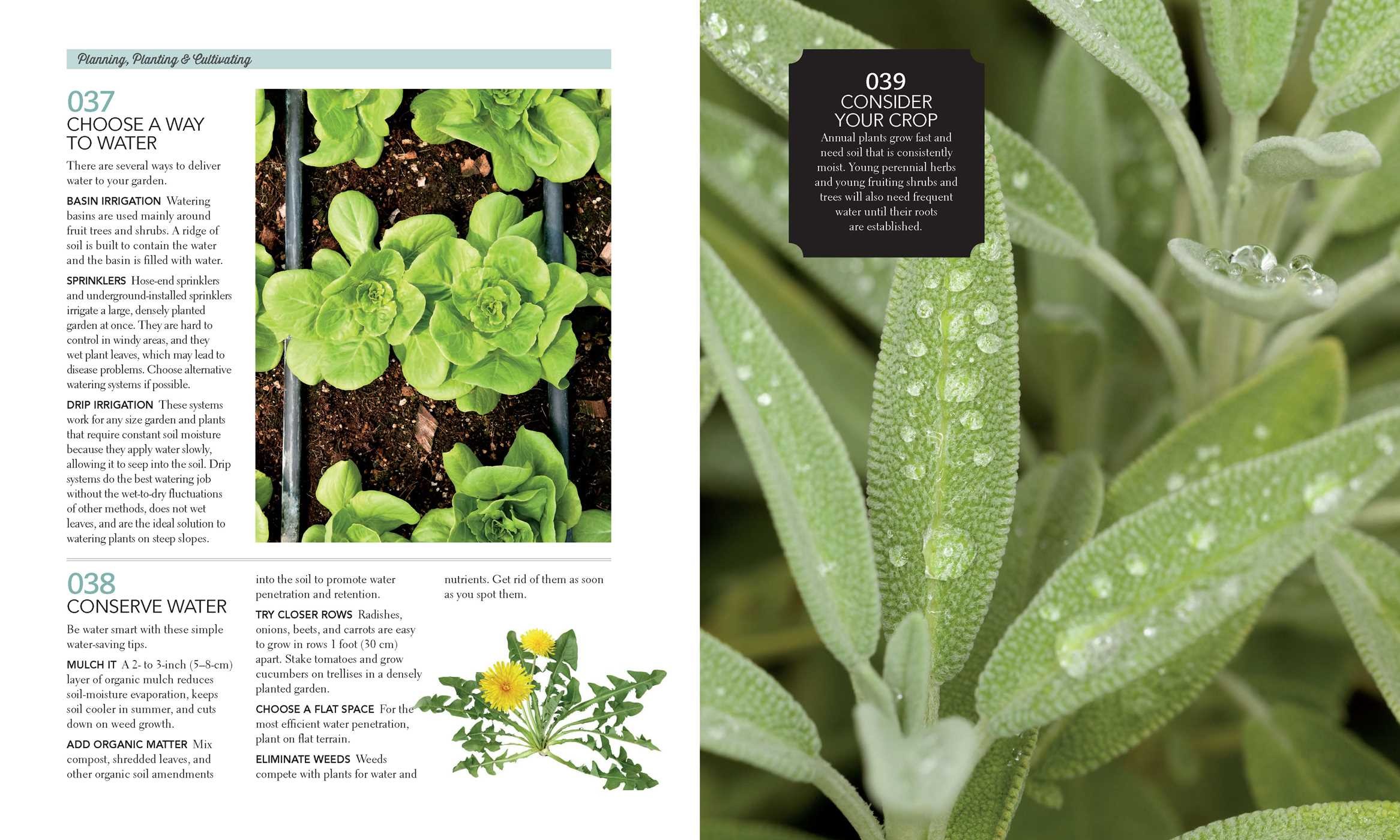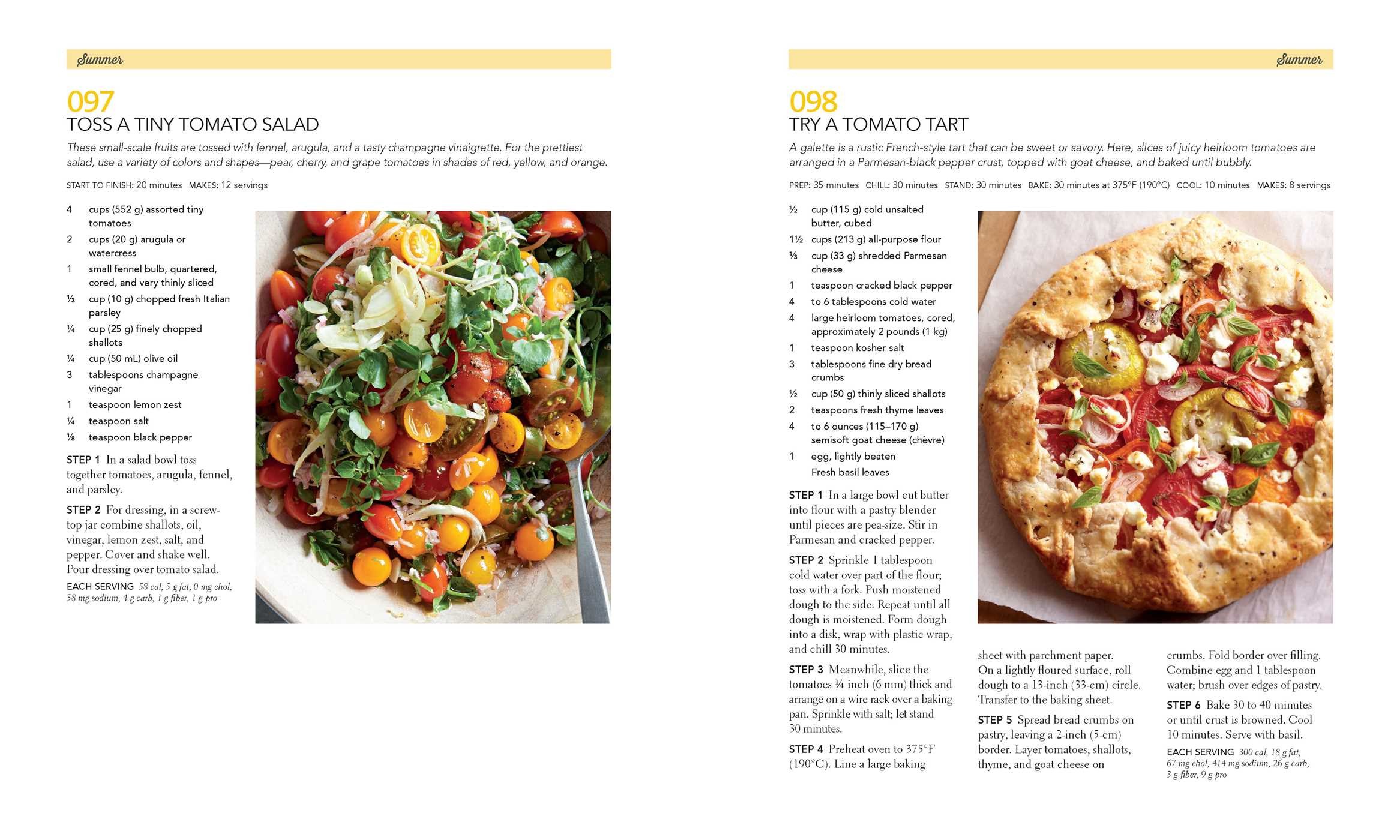Plus get our latest book recommendations, author news, and competitions right to your inbox.
The Edible Garden
Grow Your Own Vegetables, Fruits & Herbs No Matter Where You Live
Published by Weldon Owen
Distributed by Simon & Schuster
Table of Contents
About The Book
From the experts at Country Gardens magazine, The Edible Garden will show you how to reap fresh vegetables, delicious fruits, and essential herbs from a garden of any size, in any space, no matter how small. Bring organic produce to your table and create delicious hand-crafted meals with the harvest from your back yard or windowsill! The Edible Garden is the complete guide to growing a bountiful, edible home garden. With over a hundred years of experience, the editors of Better Homes & Gardens’ special-interest publications know gardening from the ground up! In this beautiful, photo-laden book the authors show how any space can yield a plentiful crop of tasty vegetables, fresh fruits, delicious herbs, and more. Whether you’re working with a rooftop hideaway, a suburban backyard, or even a tiny window box or all-indoor container garden, it’s easier than you think.
Highlights include: Detailed step-by-step instructions for creating the garden of your dreams in the space you have.
A seasonal guide to crops with descriptions of varieties for each, including when and how to plant. All the basics you need to start, from tools and containers to seeds and soil.
Simple recipes that show how to use your crop yield—and what to do when your garden produces more than you ever expected! Covers a wide range of topics, including: Starting from Seed: Save money by growing from seeds—including those you save yourself from your everyday meals. Making the Plan: How to assess the space at hand and plan to use it most efficiently, including seasonal tips for various environments.
Organic Solutions: Raise the healthiest food and protect the environment with these handy hints, including all-natural, chemical-free pest repellants, weed control, and soil enrichment. Container Gardening: Grow food for your table on a balcony, patio, or other small space. Special tips on how to grow some basics even if you’ve only got a window box to work with. Raised-Bed Gardens: All the rage in suburban front and back yards, rooftops, and community gardens, this results-intensive gardening method yields amazing harvests. Yard-to-Table: Recipes for your backyard bounty focusing on just-picked delights such as fresh tomato and arugula salad, crispy zucchini fritter, and cool cucumber sangria.
Highlights include: Detailed step-by-step instructions for creating the garden of your dreams in the space you have.
A seasonal guide to crops with descriptions of varieties for each, including when and how to plant. All the basics you need to start, from tools and containers to seeds and soil.
Simple recipes that show how to use your crop yield—and what to do when your garden produces more than you ever expected! Covers a wide range of topics, including: Starting from Seed: Save money by growing from seeds—including those you save yourself from your everyday meals. Making the Plan: How to assess the space at hand and plan to use it most efficiently, including seasonal tips for various environments.
Organic Solutions: Raise the healthiest food and protect the environment with these handy hints, including all-natural, chemical-free pest repellants, weed control, and soil enrichment. Container Gardening: Grow food for your table on a balcony, patio, or other small space. Special tips on how to grow some basics even if you’ve only got a window box to work with. Raised-Bed Gardens: All the rage in suburban front and back yards, rooftops, and community gardens, this results-intensive gardening method yields amazing harvests. Yard-to-Table: Recipes for your backyard bounty focusing on just-picked delights such as fresh tomato and arugula salad, crispy zucchini fritter, and cool cucumber sangria.
Excerpt
156 Pumpkins: PLANT, GROW & HARVEST
SITE Choose a large sunny spot so pumpkin plants can spread. Pumpkins do best in slightly acidic
soil that drains easily.
BEDMATES Pumpkins can share space with corn, melons, and other squash. However, pumpkins are
space hogs and need a lot of room on their own.
CARE Keep pumpkin vines free of weeds by shallow hoeing around plants.
HOW TO START Sow seeds directly in the ground when the soil/air temperatures reach at least
70°F (21°C) Start seeds ahead of the season and plant seedlings too.
HARVEST Begin harvest in late September or early October—before a hard frost. Pick pumpkins
when they are a deep, solid color (depending on variety, this may be orange, white, or cream). Wear gloves (vines have prickles on the stems) and use pruning shears to cut each pumpkin from its vine. Leave 3 to 4 inches (8–10 cm) of stem attached and they will keep longer.
PESTS AND DISEASES Pumpkins are susceptible to fungal diseases such as powdery mildew. Treat
with a fungicide. Insects attracted to pumpkins include cucumber beetles and squash bugs. If you use insecticides, apply in late afternoon or early evening after pumpkin blossoms have closed so bees are not adversely affected.
STIR UP SOME PUMPKIN RISOTTO
2 cups (475 mL) water
1¾ cups (425 mL) chicken broth
3 tablespoons unsalted butter
1 cup (150 g) finely chopped onion
1 clove garlic, minced
2 cups (394 g) arborio rice
1 cup (250 mL) dry white wine
1½ tablespoons snipped fresh sage
1 cup (227 g) Pumpkin Puree
1/2 cup (50 g) finely shredded
Parmigiano-Reggiano cheese
Shaved Parmigiano-Reggiano cheese
Sage leaves (optional)
STEP 1 In a large saucepan bring water and broth to boiling; reduce heat to maintain simmer.
STEP 2 In a heavy 4-quart (4-L) pot melt butter over medium heat. Add onion and garlic; cook 3 minutes or until tender, stirring occasionally. Add rice; cook and stir 2 minutes. Add wine; cook and stir until liquid is absorbed. Stir in snipped sage and 1 cup (250 mL) of broth mixture; stir until almost all the liquid is absorbed. Continue cooking and adding broth, 1 cup (250 mL) at a time, until rice is tender but still firm to the bite and risotto is creamy.
STEP 3 Stir pumpkin puree and the ½ cup (50 g) cheese into risotto. Heat through, about 1 minute. Top with shaved cheese and, if desired, sage leaves.
STEP 4 Pumpkin Puree: Preheat oven to 375°F (190°C). Cut 2½ pounds (1 kg) pie pumpkins
into 5x5-inch (13x13-cm) pieces. Remove and discard seeds and strings. Arrange pieces, skin sides up, in a foil-lined baking pan. Cover with foil. Bake 1 hour or until tender. Scoop pulp from rind. Place pulp in a food processor or blender. Cover and process or blend until smooth.
Makes 1¾ cups (397 g).
EACH SERVING 385 cal, 11 g fat,
26 mg chol, 547 mg sodium, 61 g carb,
6 g fiber, 10 g pro
SITE Choose a large sunny spot so pumpkin plants can spread. Pumpkins do best in slightly acidic
soil that drains easily.
BEDMATES Pumpkins can share space with corn, melons, and other squash. However, pumpkins are
space hogs and need a lot of room on their own.
CARE Keep pumpkin vines free of weeds by shallow hoeing around plants.
HOW TO START Sow seeds directly in the ground when the soil/air temperatures reach at least
70°F (21°C) Start seeds ahead of the season and plant seedlings too.
HARVEST Begin harvest in late September or early October—before a hard frost. Pick pumpkins
when they are a deep, solid color (depending on variety, this may be orange, white, or cream). Wear gloves (vines have prickles on the stems) and use pruning shears to cut each pumpkin from its vine. Leave 3 to 4 inches (8–10 cm) of stem attached and they will keep longer.
PESTS AND DISEASES Pumpkins are susceptible to fungal diseases such as powdery mildew. Treat
with a fungicide. Insects attracted to pumpkins include cucumber beetles and squash bugs. If you use insecticides, apply in late afternoon or early evening after pumpkin blossoms have closed so bees are not adversely affected.
STIR UP SOME PUMPKIN RISOTTO
2 cups (475 mL) water
1¾ cups (425 mL) chicken broth
3 tablespoons unsalted butter
1 cup (150 g) finely chopped onion
1 clove garlic, minced
2 cups (394 g) arborio rice
1 cup (250 mL) dry white wine
1½ tablespoons snipped fresh sage
1 cup (227 g) Pumpkin Puree
1/2 cup (50 g) finely shredded
Parmigiano-Reggiano cheese
Shaved Parmigiano-Reggiano cheese
Sage leaves (optional)
STEP 1 In a large saucepan bring water and broth to boiling; reduce heat to maintain simmer.
STEP 2 In a heavy 4-quart (4-L) pot melt butter over medium heat. Add onion and garlic; cook 3 minutes or until tender, stirring occasionally. Add rice; cook and stir 2 minutes. Add wine; cook and stir until liquid is absorbed. Stir in snipped sage and 1 cup (250 mL) of broth mixture; stir until almost all the liquid is absorbed. Continue cooking and adding broth, 1 cup (250 mL) at a time, until rice is tender but still firm to the bite and risotto is creamy.
STEP 3 Stir pumpkin puree and the ½ cup (50 g) cheese into risotto. Heat through, about 1 minute. Top with shaved cheese and, if desired, sage leaves.
STEP 4 Pumpkin Puree: Preheat oven to 375°F (190°C). Cut 2½ pounds (1 kg) pie pumpkins
into 5x5-inch (13x13-cm) pieces. Remove and discard seeds and strings. Arrange pieces, skin sides up, in a foil-lined baking pan. Cover with foil. Bake 1 hour or until tender. Scoop pulp from rind. Place pulp in a food processor or blender. Cover and process or blend until smooth.
Makes 1¾ cups (397 g).
EACH SERVING 385 cal, 11 g fat,
26 mg chol, 547 mg sodium, 61 g carb,
6 g fiber, 10 g pro
Product Details
- Publisher: Weldon Owen (July 25, 2017)
- Length: 160 pages
- ISBN13: 9781681882345
Browse Related Books
Resources and Downloads
High Resolution Images
- Book Cover Image (jpg): The Edible Garden Trade Paperback 9781681882345









